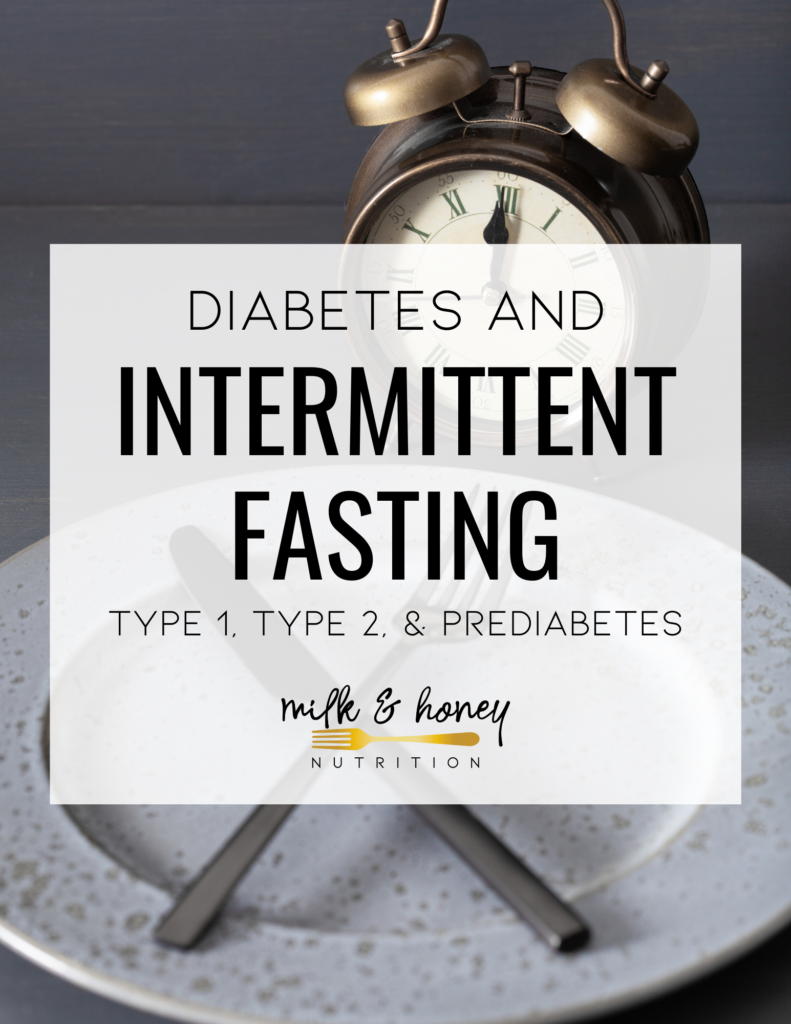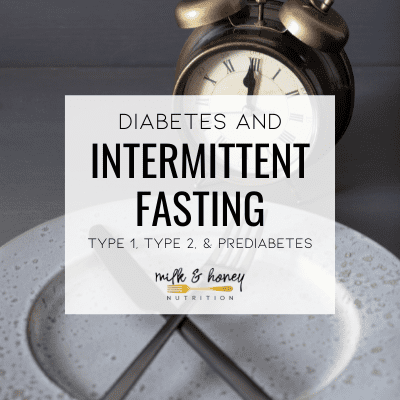
In this article, we’ll focus on the safety and effectiveness of intermittent fasting and diabetes management.
Intermittent fasting and time-restricted eating (TRE) have been studied in several forms over the years and some studies do show possible improvements in some diabetes markers like blood glucose and HgbA1c. But there are some gaps in the research and the question remains, is intermittent fasting and diabetes a safe and effective way to manage diabetes over long periods of time?
***This article is not intended to provide medical advice, diagnosis, opinion, treatment or services. This article and the links contained in it provide general information for educational purposes only. The information provided in this article is not a substitute for medical care, and should not be used in place of the advice of your physician or registered dietitian.
What is intermittent fasting?
Before we dive in, let’s define the terms “intermittent fasting” and “time-restricted eating”. Most people use the term intermittent fasting, but they’re actually talking about time restricted eating.
Intermittent fasting definition
Intermittent fasting is a diet that restricts calorie intake to a set timeframe, without reducing overall calorie intake.
Periodic fasting limits calorie intake to certain days of the week and calls for fasting over longer periods of time. These fasting periods last for 24 hours and happen 2-4 days/week.
Time restricted eating (TRE) is more common and is often what people are referring to when they use the phrase “intermittent fasting.” TRE restricts calorie consumption to a set timeframe each day. These time frames can range from 4-12 hours usually. And the remainder of the day is a fasting period.
For the purposes of this article, we will use the phrase intermittent fasting to describe TRE.
Types of intermittent fasting
In this article we’ll look at a few different types of intermittent fasting and diabetes. These include:
- 16:8 intermittent fasting
- 20:4 intermittent fasting
- OMAD intermittent fasting
16:8 intermittent fasting
16:8 intermittent fasting is one of the mildest forms of TRE. People following this protocol consume all of their calories within an 8 hour window, and fast for the remaining 16 hours of the day. This 8 hour window can happen earlier in the day or later in the day.
20:4 intermittent fasting
20:4 intermittent fasting is a more restrictive form of intermittent fasting. People following this protocol consume all of their calories within a 4 hour window, and fast for the remaining 20 hours of the day.
OMAD intermittent fasting
OMAD stands for “one-meal-a-day”. People following this regimen consume all of their calories at one meal, usually within a one hour timeframe, and fast for the remainder of the day.

Can people with diabetes do intermittent fasting?
So, can people with diabetes fast? Yes, they can. But, is intermittent fasting safe for people with diabetes? And is it an effective way to manage diabetes and other metabolic conditions?
Is fasting good for diabetes?
Research has shown that intermittent fasting (the forms we defined above and others) may be beneficial. It may lower blood glucose levels (both fasting and after meals), blood insulin, and HgbA1c, but there are side effects and potential risks. And, although the research is promising for intermittent fasting and diabetes, additional research should be done in more populations and for longer periods of time. (I’ll talk more about this in detail below.)
How long can a person with diabetes go without eating?
If you choose to adopt a form of intermittent fasting to help manage diabetes, this question/decision is why it is vitally important to speak with your doctor before starting. Not only do you need to consider what is safe for you, your mental health, and your diabetes management; but also what is practical for your lifestyle and needs. Your healthcare team should be involved in this decision.
Intermittent fasting and type 1 diabetes
It is universally agreed that people with type 1 diabetes should not attempt intermittent fasting. Fasting increases the risk of both severe hypoglycemia and hyperglycemia in people with type 1 diabetes.

Intermittent fasting and type 2 diabetes
Unlike people with type 1 diabetes, people with type 2 diabetes and prediabetes may be able to safely benefit from intermittent fasting. But, it should not be attempted without supervision from your healthcare team and considering the risks and side effects.
A review paper published in September 2021 stated that pilot human studies (this refers to initial smaller studies) show that intermittent fasting may have benefits. These include reducing the risk of excess undesired body weight, diabetes, and heart disease. But, more research is needed in larger and more diverse populations to say this for sure. The study authors also emphasize that a consistent long overnight fast regardless of time is likely to be protective against these same diseases.
But, what about people who already have type 2 diabetes or prediabetes? How could intermittent fasting benefit them?
Intermittent fasting and type 2 diabetes with metformin
Whether you’re taking metformin or another oral medication, it is important to speak with your doctor about using intermittent fasting in your diabetes management. If you are on an MDI (multiple daily injections) insulin regimen, most professionals agree that intermittent fasting may not be a safe option.
16:8 intermittent fasting with diabetes
One small study published in 2018 showed improvements in insulin sensitivity, blood pressure, and other health markers, but no improvement in blood sugar levels.
Another study showed that consuming food in a 10 hour window may be beneficial. Fasting resulted in weight loss, and improved blood pressure, cholesterol, and HgbA1c.
Alternate day intermittent fasting with diabetes
A small case study of three men with type 2 diabetes showed fasting 3 days/week (alternate day fasting) over a 6+ month period resulted in no longer needing insulin to manage their diabetes, and improved HgbA1c.
While these results seem promising, it’s important to note that these studies are extremely small and are in very limited populations. Thus, we cannot make general recommendations off of these studies.
Research on intermittent fasting in the diabetes population is limited. Intermittent fasting and diabetes is still considered an experimental treatment. It needs to be studied more before larger recommendations can be made.
But, these promising results may motivate you to speak with your doctor about using intermittent fasting in your diabetes management strategy. So, let’s review some of the known side effects of intermittent fasting to help you determine if it might be something you’re interested in trying.

Intermittent fasting side effects
There may be some positive benefits to physical metabolic health with intermittent fasting in diabetes. But, this does not mean it is something everyone should do. There are other factors to consider to determine if this way of eating is appropriate for you.
Emotional stress
Intermittent fasting is a diet that requires you to limit foods to certain times of the day. As a result, you may feel some form of emotional and mental stress at not being “able” to eat at certain times of the day. If you have a history of disordered eating, a diagnosed eating disorder, and other mental health conditions, do not attempt intermittent fasting.
Fatigue
Going long periods of time without eating may result in physical fatigue and mental confusion, as well as an inability to concentrate on daily tasks.
Hunger
Longer periods of fasting will result in increased hunger which can be uncomfortable and painful.
Intermittent fasting headache
Many people report headaches when they go long periods of time without eating, and when they are dehydrated. (Dehydration is a risk with intermittent fasting which we will discuss below)
Intermittent fasting diarrhea
During periods of fasting, your bowels are “at rest” because they are not digesting food. After long periods of fasting, when you reintroduce food, some people experience GI distress such as diarrhea. This can also lead to dehydration.
Dangers of intermittent fasting
Other more serious complications of fasting can occur as well.
Hypoglycemia
Long periods of time without food increases the risk of hypoglycemia (low blood sugar) in people with diabetes and prediabetes.
Hyperglycemia
Furthermore, when a full day of eating is consumed in a shorter time period, some people experience hyperglycemia (high/elevated blood sugar) as a result.

Dehydration
The fluid we take in each day that helps keep us hydrated comes from the things we drink AND the foods we eat. When people are fasting and not consuming food, that additional source of fluid is removed and there is a greater risk of dehydration. And, this can be exacerbated even further if you experience GI distress while fasting as we discussed above.
Psychological stress of intermittent fasting
Any diet can result in psychological distress and a disordered relationship with food. And any eating pattern that forces people to deny feelings of hunger at certain times of the day can cause additional emotional distress and damage.
Can intermittent fasting cause diabetes?
While no human studies have shown a direct connection between intermittent fasting and diabetes development, a recent animal study showed that rats who fasted every other day showed damage to the insulin-producing beta cells in the pancreas, and increased insulin resistance.
Benefits of intermittent fasting
Intermittent fasting may offer a way to lose weight (for those that want to) without restricting the overall number of calories consumed, and may provide improvements in certain diabetes-related metabolic markers.
Intermittent fasting and diabetes: Key takeaways
So, after all of that, what’s the answer to our question? Is intermittent fasting and diabetes effective and safe?
Is intermittent fasting good for diabetes, blood glucose, and insulin levels?
Research, though not conclusive, has shown promising positive physical benefits for people with type 2 diabetes and prediabetes. Whether or not it is appropriate for you though depends on your lifestyle, emotional needs, and doctor’s input.
Is intermittent fasting safe for diabetes?
Intermittent fasting may be safe for some people with type 2 diabetes and prediabetes, but not everyone. You must consider the emotional and lifestyle impact of such a drastic change in eating patterns. And, as always, speak with your doctor to get their thoughts and discuss what is safest and best for your situation.







2 Responses
Thank you for sharing. These are such helpful tips for people with Diabetes. Following these, many might prevent themselves from Diabetes and will help Diabetes patients with the right diet.
So glad you did this post. I tried IF and really enjoyed it for a while. I am type 1 and it was just so nice not to have to bolus as often. Strangely I noticed a decrease in insulin sensitivity after a while. I still do it occasionally but it’s not the best choice for me.